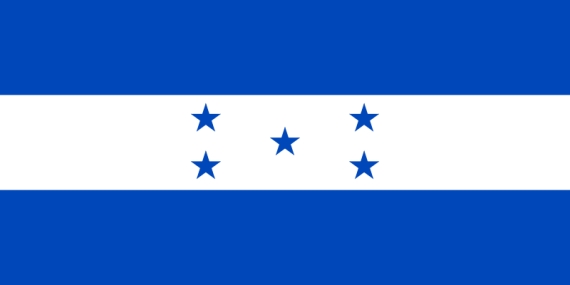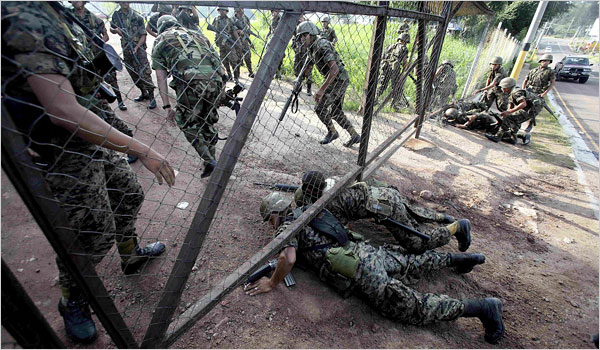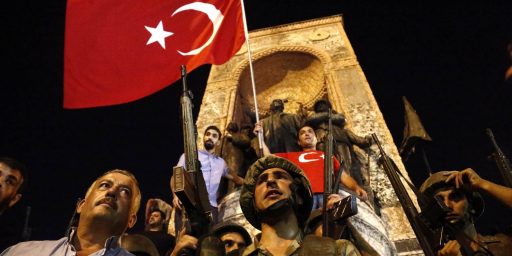Honduran Truth and Reconciliation Commission Issues Ruling
Institutions, or the lack thereof, matter.
 Via the BBC: Honduras Truth Commission rules Zelaya removal was coup
Via the BBC: Honduras Truth Commission rules Zelaya removal was coup
The Honduras Truth and Reconciliation Commission has concluded that the removal from office of former President Manuel Zelaya was a coup.
[…]
The Commission said Mr Zelaya broke the law when he disregarded the Supreme Court ruling ordering him to cancel the referendum.
[…]
The report said the Honduran Congress lacked a clear procedure to resolve power conflicts such as the one which arose in June 2009 between the president and Congress, but that it had acted beyond its limits by deposing the president.
The report further said that Congress overstepped its powers when it nominated Speaker of Congress Roberto Micheletti as interim president.
This pretty much sums up my conclusions on the situation at the time that 1) it was a coup (as I noted from the beginning), that 2) Zelaya acted illegally in refusing to stop the plebiscite (see discussion here and here), and that 3) the whole situation was made all the more problematic because of a lack of adequate institutional mechanisms to deal with Zelaya’s actions.
Now, it is worth noting that of the transgressions under discussion, the illegal removal of the president (and his exile) was by far the most egregious.
A major issue for the Honduran government ought to be constitutional reform to create a procedure for dealing with a president who ignores a court order as well as a functional impeachment process (as it stands, things are vague and dysfunctional).
Institutions, or the lack thereof, matter.
The Commission was appointed by the OAS and has no binding legal authority on the Honduran government.






And as I’ve said before, points 1 and 2 are incompatible. If the president is doing something illegal, stopping him from doing so is not overthrowing the government. What the military did may have been illegal as well, but it was not a coup.
Sorry, but this sentence makes no sense. Stopping a president from breaking the law certainly does not necessarily entail overthrowing the government, but in this case, that is obviously what they did. How can you pretend that arresting the president and kicking him out of the country doesn’t amount to overthrowing the government?
And of course it was a coup. By what definition of coup is it not?
@Stormy Dragon: I am going to be blunt: you are wrong. The choice set for dealing with illegality is not: 1) do nothing, or 2) coup.
I am to the point (having argued this endlessly at the time) that I do not see how one can take the position that having the military show up at the presidential residence in the wee hours of Sunday morning to take the president, still in his PJs, to a plane and then depositing him in a foreign country equates to a defensible, legal action.
It doesn’t. My argument is not that the military’s action was defensible or legal (it wasn’t). It’s that not all illegal, indefensible actions are coups. The problem is you continue to equate one man with the whole of the Honduran government.
@Stormy Dragon: When is an illegal removal of a head of government anything other than a coup?
When is an illegal arrest anything other than kidnapping? When the law enforcement officers executing the arrest warrant reasonably believe themselves to have been executing a valid warrant.
I’ve not seen anything to suggest the military’s move was motivated by anything other than the desire to protect the constitutionally institued government of Honduras from an admittedly illegal attempt at subversion by the President. They chose an illegal method of doing so and should be held to account for that, but to describe it as an attempt to overthrow the government is to assume a mens rea completely opposite to the evidence.
Or perhaps an alternate analogy:
When Lee Harvey Oswald assassinated President Kennedy, would you describe that as having successfully overthrown the US government? If merely removing the head of state from office illegally is sufficient to constitute a coup, then you must argue that yes he did.
Now I think most people would recognize that while the Kennedy assassination was certainly a tragedy for the country, our government remained in place an continued on through the crisis.
@Stormy Dragon: If a head of government is illegally removed, then it is a coup. The motivations of those engaging in the action are not relevant to the definition of the term.
If a madman shot the president because he thought he was taking out the Anti-Christ and God told him to do it make it any less of an assassination?
@Stormy Dragon: The problem seems to be that you think that “coup” means overthrowing the entire government. It does not.
If Oswalt had shot JFK and then some of Oswald’s compatriots took power illegally, then it would have been a coup. In the JFK case, at his death we followed the legal process of the VP constitutionally becoming president.
My question wasn’t whether Oswald assassinated Kennedy, it’s whether the assassination was a coup. Under your definition, “If a head of government is illegally removed, then it is a coup.” , the Kennedy assassination was a coup.
I’d argue that most people would not consider the Kennedy assassination a coup, so there is some further qualification missing from your definition.
@Stormy Dragon: You are being pedantic.
The clear purpose of the actions under discussion was to remove Zelaya from power (and, again, the country). Not only that, but forced exile is unconstitutional in Honduras and the constitutional process of succession was not followed (the Speaker should not have been made acting president). All of this was clearly part of a process to illegally remove the elected president. That’s a coup.
You can call it what you like, but a rose by any other name still smells as sweet.
Isn’t most real news these days?
Greetings:
So, your point is that an institution that was “appointed by the OAS and has no binding legal authority on the Honduran government” matters ???
@11B40: It was a simply statement of fact and I mentioned it so as to make clear that the findings were not that of Honduran government.
That would matter, I would think, yes?
@11B40: To clarify, after re-reading your comment: the institutional mechanism that really mattered here was an adequate constitutional means to deal with the illegal actions of a president.
As I said in the post:
We can argue once again if it was a “coup” all day long. However IMO removing a President from office that refused to follow their Constitution, their Congress, and their Supreme Court was the right thing to do.
If it is your opinion that a President that does all those things should remain in power then we have a different idea of what a Democratic government should be like.
The fact that they didn’t have the foresight to spell out how to dispose a President in their Constitution doesn’t change the fact of wither the President should or should not be dispose of if he violated all those conditions above.
@Wayne: The way these issued are handles matters greatly, especially in a democratic setting.
@Steven
Do you support removing a President from office that refuses to follow their Constitution, their Congress, and their Supreme Court?
@Wayne: Where did I say I supported Zelaya’s actions?
Again: the method of dealing with a conflicts amongst the branches matters greatly.
I do not understand why properly defining what happened as a “coup” is seen as support for a president defying a court order.
By that logic you are stating that you support forced exile for a president who defies a court order.
@Steven
Just to clarify if I got you right. You are not saying that they shouldn’t have removed the President from office that refuses to follow their Constitution, their Congress, and their Supreme Court only they should have done it in a different manner?
Seeing how their founders didn’t have the wisdom to put removing the President in their Constitution, I’m not sure if they could have handled it much better. The viable options after disposing him were to force him into exile or throw him in jail since he showed no inclination of following the law. Unless you think it is acceptable to allow a person to continually break laws without consequences?
@Wayne: I think some combination of court and congressional action would have been preferable to forced exile at the hands of the military.
@Steven
He ignored actions taken by their highest court and legislative branch. When you have a President that ignores the others two branches you two options. Allow him to continue to do so or remove him from office. You either use national law enforcement or the military to do so. In many of those countries the military is the main internal security apparatus. Honduras is one of those countries.
.” Its mission is to “defend the territorial integrity and sovereignty of the Republic, to maintain peace, public order and the integrity of the Constitution, the principle of free elections and regular presidential succession.”
http://www.photius.com/countries/honduras/national_security/honduras_national_security_constitutional_and_o~27.html
I’m not sure why you seem so hung up on the term or use of “military”. I know the liberal media and teaching has treated that word with disdain in the past but it is not. There have been cases where a nation military has gotten out of hand but many where they haven’t. This time they were carrying out the will of their highest court and legislative branch.
@Wayne:
I am not sure why you think I am hung up on the term. The military are the ones who took the president from his home to Costa Rica.
Beyond that, you must not be too familiar with the politics of Latin America if you do not understand the rather significant role the military has played there (including in Honduras). This is no small issue.
Beyond that; I must confess that I find it problematic that you seem to think that the only option was arrest and exile.
One more thing
Re “By that logic you are stating that you support forced exile for a president who defies a court order.
“
If a president refuses to abide to Supreme Court Orders and the Legislative Branch plus refused to step down then yes I support either throwing him in jail or exiling him.
The only other alternative is to allow him to continue his violations. Ideally it wouldn’t come to any of the above actions but unfortunately in the real world we don’t have that choice. So you got to deal with the choices you have.
What are the other options?
Passing more resolutions get you more pieces of paper. Without enforcement that is all they are.
He could have further been challenged in court. The Congress could have further acted. There could have been actions to stop the plebiscite. Even if the plebiscite took place, the courts could have nullified the result or the ballots could not have been counted.
At a minimum, a trial of some sort seems in order, yes? As opposed to summary removal from power.
I am curious as to why you are so convinced that the proper actions where undertaken.
@Wayne:
Well, that is often how things play out in democracies (and courts in general): a lot of paper before full resolution takes place.
Further, the question of harms is in play. The exact amount of harm that that plebiscite was going to create was less than the amount of trouble the exile caused. One has to keep in mind that Zelaya’s term was almost up in any event.
He had a trial and their Supreme Court ruled against him. He not only defy them on that issue but many others including trying to replace the Head of the military which is against their Constitution as well.
If you have an arrest warrant for someone you don’t keep going back and keep getting more. You shouldn’t allow them to continue their crime spree either.
If you think arresting him would have been better, fine. However there are many problems with doing that to a President as well.
Re “Well, that is often how things play out in democracies (and courts in general): a lot of paper before full resolution takes place.”
Can you name anytime the U.S. Supreme Court ruled with the backing of congress against a person or entity and was allowed to continue with their illegal activity?
@Wayne:
1) Desegregation was a protracted fight even after Brown was issued.
2) There is still prayer in public schools.
I am convinced they did the right thing because the President refused to follow their Constitution, their Congress, and their Supreme Court. When a President does that he should be removed from office.
IMO allowing a President to do that does much more harm in the long run than being bad mouth for a little while for exiling him. Anytime you allow people especially those in authority to openly flaunt the rules then it just snowballs down the road.
I saw it many times when I work at a prison a long time ago. Officer would let them get away with openly breaking the rules on the small stuff because “it just not worth the effort”. Then the inmates kept pushing the line further and further until it way out of hand and blew up. The units where they nip it early on almost always had less trouble than those who didn’t.
Many Special Forces personnel can attest that it happens with countries as well. A little open corruption here and there. People see it and think that since people are doing it in the open then that must the way it is done. Then they do it and push it even further then it just snowballs. Then things really tend to go to hell.
Can all corruption or rule breaking be stop? No. In reality it is not even worth trying to eliminate them all. You should try to minimize it and you sure as hell shouldn’t allow them especially those in authority to openly flaunt it.
A President refusing to follow all three of their Constitution, their Congress, and their Supreme Court certainly shouldn’t be allowed.
@Wayne: And, of course, the only solution was a dawn arrest and exile.
Did they turn a blind eye to desegregation? No they went out and enforced the law. They even used OMG the “military” to enforce it.
The ruling never said prayer wasn’t allowed in school only that there were limits in what the “schools” themselves did.
Both cases were results of one branch of government the Supreme Court ruling. It wasn’t a law pass by the legislator and ruled by the Supreme Court. Either way both rulings are being enforced instead of turning a blind eye to them.
@Steven
That is lame. I already spell out some other solutions. There is a point where enforcement need to be done.
The above solution is a better solution than continually passing more resolutions putting the President on double secret probation and such.
@Wayne: But the whole “coup” discussion is predicated on whether the way the situation was dealt with was legal and appropriate.
And I really do not understand why you are hung on the military issue. Again: if you think that military action in this context is no big deal then you simply do not understand the political history of either Latin America in general or Honduras in specific.
As I already stated “There have been cases where a nation military has gotten out of hand but many where they haven’t.”
If all you know is the bad things the military has done in that part of the world then you don’t even know half of what went on down there. There is a great deal they don’t teach you in school. Although one should have pick up more than military was all bad down there but with liberal teachers understandable.
It is in the Honduras Constitution that it is the military that has primary responsible for enforcement of such measures. So no I don’t think it is that big of deal. It would be like our U.S. Marshals carrying out a similar action here in the U.S.
You said you didn’t agree with what Zelaya did.
However you never answer the question that if a President repeatedly violates their Constitution, repeatedly defies their Congress, and their Supreme Court, wither that President should be allowed to remain in office or not. Or is it will sometimes yes and sometimes no?
@Wayne: My answer has been consistently that a morning arrest and exile was inappropriate, and, indeed, was unconstitutional. Hence, “coup.”
The Honduran Constitution provides some vague process that the Congress could have initiated to deal with the president in a legal fashion. They chose not to do so. Have you bothered to read the document and the relevant passages, including the one that states that forced exile is unconstitutional? I have.
I don’t understand why this is so difficult to understand.
Once again you avoided the question.
@Wayne: No, I haven’t; rather, you have never understood my answer.
You said you didn’t like what either side did. That is not answering the question that is avoiding it.
@Wayne: No, I didn’t. I think that he should have been dealt with legally, not illegally. This is not that complicated.